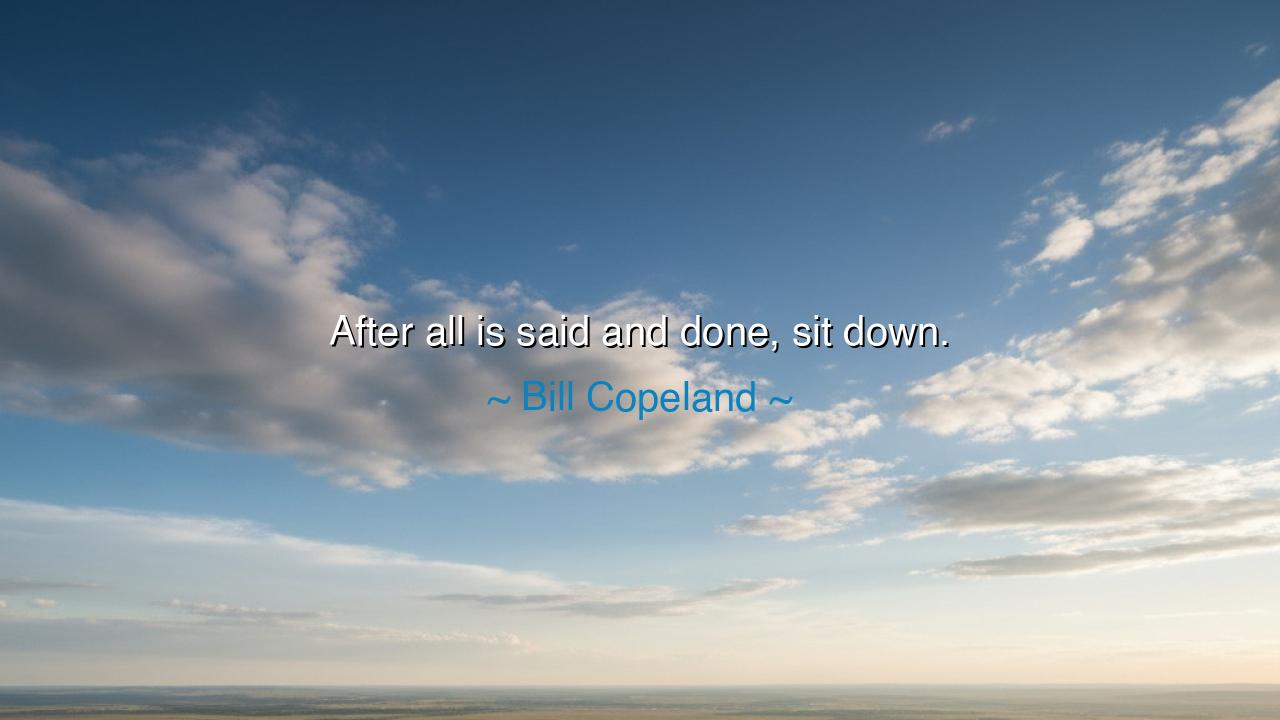
After all is said and done, sit down.






“After all is said and done, sit down.” — in this brief and deceptively simple phrase, Bill Copeland, the American poet and writer, captures a truth as old as time: that there is wisdom not only in action, but in rest, and that silence is often the most eloquent conclusion to words and deeds. His saying may appear humorous at first, even casual, yet beneath it lies the weight of centuries of human striving. For in a world obsessed with constant motion and endless speech, to sit down is to reclaim one’s peace — to acknowledge that the cycle of effort has reached its natural end, and that reflection is as sacred as action itself.
Copeland’s words evoke the rhythm of life itself — a dance of doing and being, of speech and stillness. “After all is said and done,” he begins — a phrase that encompasses the entire arc of human endeavor: our plans, our struggles, our victories, and our words. But the command that follows — “sit down” — transforms this momentum into quiet. It is as if he is saying: Cease striving. Let the storm of your efforts subside. There comes a moment when one must stop chasing, stop explaining, stop performing — and simply be. For the heart, like the earth after rain, must rest before it can bear fruit again.
The ancient philosophers understood this truth well. Lao Tzu, the sage of the Tao, taught that action must be followed by stillness, and that those who grasp too tightly lose their way. Marcus Aurelius, the Roman emperor and Stoic, would often retire from the noise of power into inner calm, writing in his Meditations: “Nowhere can man find a quieter or more untroubled retreat than in his own soul.” Copeland’s counsel follows in their tradition. His humor softens the wisdom, but it does not disguise it: he reminds us that rest is not weakness — it is the restoration of balance, the pause between breaths that gives life its rhythm.
There is a story from history that mirrors this lesson. When Abraham Lincoln signed the Emancipation Proclamation — one of the most momentous acts in the history of humankind — he did so with a trembling hand, weary from hours of labor and decision. Afterward, he laid down his pen, looked at those gathered, and simply said, “It is done.” Then he sat. That moment of stillness — quiet, unadorned, uncelebrated — was not the end of his greatness, but its reflection. For those who act greatly must also know when to rest greatly, when to let the weight of action sink into the soul and find meaning there.
In modern times, however, people have forgotten this sacred pause. We live in the age of endless motion — where even after deeds are done, we rush to narrate them, to defend them, to prove them to the world. We fill the silence that should follow achievement with noise, explanation, or pride. But Copeland, with his gentle wit, calls us back to simplicity. “Sit down” — not to retreat, but to reflect. For in stillness, we hear what motion conceals: the echo of purpose, the whisper of gratitude, the quiet truth that not everything must be said, nor everything done.
To “sit down,” then, is not the act of the tired, but of the wise. It is to accept that not all battles need to be fought endlessly; that closure, humility, and peace have their own kind of victory. The warrior lays aside his sword not in defeat, but in understanding. The thinker ends his argument not in surrender, but in clarity. There comes a time when the wisest course is to stop pushing and to let life unfold — to recognize that action without pause becomes frenzy, and speech without silence becomes noise.
The lesson, therefore, is simple yet profound: when your work is done, let it be done. When your words have been spoken, let them stand. Learn to rest without guilt, to stop without fear. Sit down, not as one who quits, but as one who trusts that the universe will carry forward what you have already set in motion. In the quiet that follows, wisdom ripens. Reflection deepens. Peace returns.
So remember, O seeker — the pause is part of the song. After the words and the deeds, after the striving and the storm, find the stillness within yourself. Sit down, as Bill Copeland teaches, and let the world breathe with you. For in the end, it is not in endless movement that we prove our worth, but in the grace with which we know when to stop — and simply rest in the beauty of what is already done.






AAdministratorAdministrator
Welcome, honored guests. Please leave a comment, we will respond soon